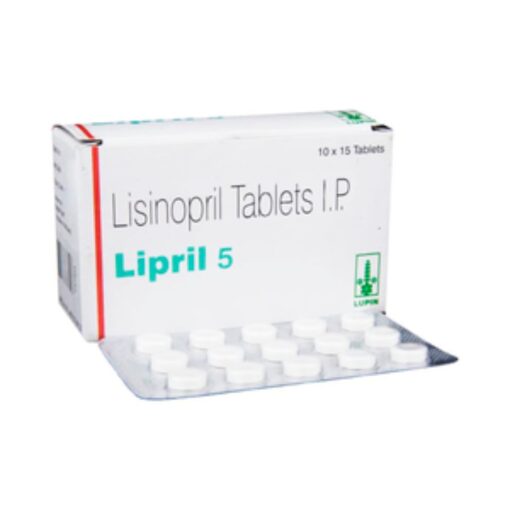Description
Lisinopril is an angiotensin-converting enzyme (ACE) inhibitor used to treat high blood pressure (hypertension), heart failure, and to improve survival after a heart attack. It works by relaxing blood vessels, which reduces the workload on the heart and allows it to pump blood more efficiently. Here is a comprehensive overview of lisinopril:
- Indications and uses: Lisinopril is primarily indicated for the treatment of hypertension, heart failure, and to improve survival after a heart attack. It may also be used to treat diabetic nephropathy, which is kidney damage caused by diabetes.
- Mechanism of action: The drug works by inhibiting the conversion of angiotensin I to angiotensin II, a potent vasoconstrictor. This results in the relaxation of blood vessels, lowering blood pressure and reducing the workload on the heart.
- Dosage and administration: Lisinopril is available as an oral tablet and is typically taken once or twice daily, depending on the prescribed dosage. The starting dose for hypertension is usually 10 mg, while the starting dose for heart failure or post-heart attack management is 2.5 to 5 mg.
- Side effects: Common side effects of lisinopril include dizziness, headache, cough, and fatigue. More severe side effects may include kidney problems, high potassium levels, and allergic reactions.
- Precautions and contraindications: Lisinopril should be used with caution in patients with kidney disease, liver disease, or a history of angioedema. It is not recommended for pregnant or breastfeeding women due to the risk of harm to the fetus or infant.
- Drug interactions: Lisinopril can interact with various medications, including diuretics, nonsteroidal anti-inflammatory drugs (NSAIDs), and potassium supplements. It is essential to inform your healthcare professional about all medications and supplements you are taking to avoid potential interactions.
- Monitoring and follow-up: Regular blood pressure checks and periodic blood tests to monitor kidney function and potassium levels are essential while taking lisinopril.
When starting treatment with lisinopril, it is crucial to discuss any existing health conditions, medications, and concerns with a healthcare professional. They will determine if lisinopril is suitable for you and may adjust the dosage or recommend alternative treatments if necessary. By following these guidelines and monitoring your condition closely, you can help ensure the safe and effective use of lisinopril for your specific needs.
BENEFITS:
The benefits of lisinopril include:
- Lower blood pressure: Lisinopril helps relax blood vessels, which reduces the workload on the heart and allows it to pump blood more efficiently. This leads to a decrease in blood pressure, reducing the risk of heart attack and stroke.
- Reduced risk of heart failure: By lowering blood pressure, lisinopril helps reduce the strain on the heart, which can prevent or delay the onset of heart failure.
- Improved survival after a heart attack: Lisinopril has been shown to improve survival rates in patients who have experienced a heart attack. It helps prevent further damage to the heart and reduces the risk of complications.
- Protection against diabetic nephropathy: In patients with diabetes, lisinopril can help protect the kidneys from damage caused by high blood sugar levels.
- Fewer side effects compared to other blood pressure medications: Lisinopril generally has fewer side effects than other blood pressure medications, making it a good choice for patients who cannot tolerate other drugs.
- Convenient once-daily dosing: Lisinopril is typically taken once a day, which can help improve medication adherence and simplify treatment for patients.
Overall, lisinopril offers several benefits in managing hypertension, heart failure, and diabetic nephropathy, while providing a convenient and well-tolerated treatment option for patients.
SIDE EFFECTS:
The side effects of lisinopril may include:
- Common side effects:
- Dizziness
- Headache
- Cough
- Fatigue
- Nausea or vomiting
- Diarrhea or constipation
- Dry mouth
- Rash or itching
- Severe side effects:
- Kidney problems
- High potassium levels (hyperkalemia)
- Low blood pressure (hypotension)
- Swelling of the face, lips, tongue, or throat (angioedema)
PRECAUTIONS:
Precautions for taking lisinopril include:
- Allergies: Inform your doctor if you have any allergies to lisinopril or other ACE inhibitors.
- Pregnancy and breastfeeding: Lisinopril is not recommended during pregnancy or breastfeeding, as it can harm the fetus or newborn.
- Kidney or liver problems: Inform your doctor if you have any kidney or liver issues, as lisinopril may need to be adjusted or a different medication prescribed.
- Diabetes: Lisinopril may increase the risk of hypoglycemia in diabetic patients. Monitor blood sugar levels closely.
- Dehydration: Avoid excessive sweating, dehydration, or exposure to high temperatures while taking lisinopril, as it may cause low blood pressure and dizziness.
- Use with other medications: Inform your doctor about all medications you are taking, including over-the-counter drugs and supplements. Lisinopril may interact with other medications, such as diuretics, potassium supplements, or lithium.
- Regular check-ups: Regularly visit your doctor for blood tests and check-ups to monitor your blood pressure, kidney function, and potassium levels.












21 reviews for Lipril (Lisinopril)